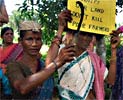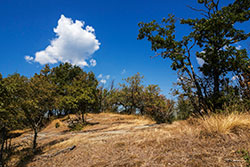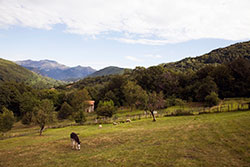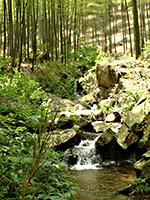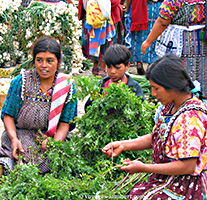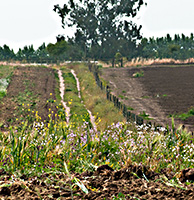A village in Northern Italy – 1948
A real friend
“Please, tell me why did you leave?” Nuto looks at me with his black eyes that are so dreamy sometimes, but now they are sharp. “Well, why does a person leave?” I answer. “I don't know. Perhaps, because I was a bastard, a peasant boy, a servant, nothing more. I was nothing.” Together with Nuto I am sitting by the reeds near the river Belbo. How often we have played here together with the other village boys, swum, caught fish, and fought also, when I was called a bastard again.
Nuto was three years older than me. He talked to me, he told me what he had seen on other farms, and explained to me that there was more than the few hills where we lived, the fields we knew. That trains went everywhere, up to the sea. And that there were ships that went to other countries. He told me about the war, and that people were provoked by it. By him, I understood that you could not only talk about what you had eaten, about the work you had to do, or about a quarrel. But that you also could say something about what happened in the world. That by talking you could come to understand your life. He was a real friend to me.
I was conscripted in Genoa. When my service ended, I went to America. There I travelled from station to station, from one state to the next. Here I worked on a farm, there as a milk vendor or highway worker. I had a lot of girlfriends, but soon I knew that I wanted to return home. That America was not my country. At a certain moment I had made a fortune without wanting it especially. I had a construction company, employed people, had a few trucks. Then I came back home.
In my village nobody recognized me. I had been away for twenty years. I had become fat and rich. I stayed in the hotel on the village square. But Nuto immediately recognized me, when I entered his carpenter's workshop. He took off his work apron, and took me for a walk. And again we talked like it was yesterday. But now it was just like we were the same age. Nuto had witnessed the fascists, the war, the partisans. But I had seen quite a lot of the world.
I told him toughly that I might be a bastard, but I still succeeded. “Don't talk like that,” he said, “okay, you succeeded, but how many wretches did not succeed? You should think about that. We have to help them. We have to change the world. You too.” I had found my old friend again.
_______________________
Source
The Moon and the Bonfires (1950) from the Italian author Cesare Pavese is a charming, sensitive novel about the peasant life.
Go to:
= the next page:
The zamindar takes the land of a peasant - West Bengal, India – around 1950, story 110.
= the Table of contents, story 109.
